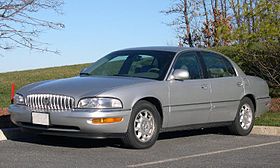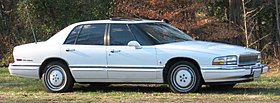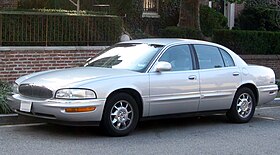Buick Park Avenue
| Buick Park Avenue | |
|---|---|
 | |
| Overview | |
| Manufacturer | Buick (General Motors, 1990-2005) Shanghai GM (2007-2012) |
| Production | 1990–2005 (U.S.) 2007–2012 (China) |
| Model years | 1991–2005 (U.S.) 2007–2012 (China) |
| Body and chassis | |
| Class | Full-size executive car |
| Body style | 4-door sedan |
| Doors | 4 |
| Chronology | |
| Predecessor | Buick Electra Buick Royaum (China) |
| Successor | Buick Lucerne (U.S.) Buick LaCrosse (China) |
The Buick Park Avenue is a full-size luxury car built by Buick. The nameplate was first used in 1975 for an appearance option package on the Electra 225 Limited. It became an Electra trim level in 1978 and its own model starting in 1991 after the Electra was discontinued. Two generations of the Park Avenue were manufactured in the United States until 2005, while in 2007 the nameplate was revived on a large Buick sedan built by Shanghai GM for the Chinese market based on the Holden Caprice from the WM/WN range. The nameplate is derived from the affluent New York City boulevard, Park Avenue.
As a sub-model
The Park Avenue remained part of the Electra model family though 1990 however, Electra references were dropped starting with the 1989 model in conjunction with the addition of the new top trim line Park Avenue Ultra. Some considered the 1989 and 1990 models the "true" first generation Park Avenues but those cars were still technically Electras. The Park Avenue didn't become a standalone model until 1991.
Essence concept car
The Buick Park Avenue Essence was a concept car designed and engineered by the Buick division of General Motors to showcase advanced technology and styling. First shown in 1989 in a light green metallic color, the Essence made rounds through the auto show circuits later in a light white. Inside the Essence was a wide, sweeping instrument panel that housed a prototype Delco Navicar navigation system among other innovations. Smooth, graceful body lines forecast the eventual production Park Avenue, introduced in 1991. The Essence was powered by the then-new 185 hp version of Buick's 3800 OHV V6 engine.
First generation (1991–1996)
| First generation | |
|---|---|
 | |
| Overview | |
| Type | Passenger car |
| Manufacturer | Buick |
| Production | 1990–1996 |
| Model years | 1991–1996 |
| Assembly | Hamtramck, Michigan, United States Lake Orion, Michigan, United States Wentzville, Missouri, United States |
| Designer | Dave Holls (1988)[1] |
| Body and chassis | |
| Body style | CW5 |
| Layout | Transverse front-engine, front-wheel drive |
| Platform | C-body |
| Doors | 4 |
| Related | Buick Roadmaster Buick LeSabre Cadillac Sixty Special Cadillac Fleetwood Cadillac DeVille Cadillac Seville Oldsmobile 88 Oldsmobile 98 Pontiac Bonneville |
| Powertrain | |
| Engine | 3.8L series I L27 Naturally aspirated V6 (91-95) 3.8L series I L67 Supercharged V6 (92-95) |
| Power output | L27 series I: 170 hp (1991-1996) L27 series I: 205 hp (1995-1996) L67 series I: 205 hp (1991-1993) L67 series I: 225 (1994-1995) L67 Series II: 240hp (1996) |
| Transmission | 4-speed 4T60-E automatic |
| Dimensions | |
| Wheelbase | 110.8 in (2,814 mm) |
| Length | 1991–93: 205.2 in (5,212 mm) 1994–96: 205.9 in (5,230 mm) |
| Width | 1991–93: 74.9 in (1,902 mm) 1994–96: 74.1 in (1,882 mm) |
| Height | 1991–93: 55.3 in (1,405 mm) 1994–96: 55.1 in (1,400 mm) |
| Curb weight | 3536 |
The 1991 Park Avenue, introduced in July 1990, utilized GM's C platform. Inspired in great part by the 1989 Park Avenue Essence show car, the Park Avenue's silhouette was often compared to that of contemporary Jaguars and many of its styling cues, including a large 'dollar-grin' grille mounted to the hood, rounded lines, and full-width tail lamps made their way to other Buick models restyled in the 1990s. The Park Avenue was Buick's largest front wheel drive sedan; the even larger rear wheel drive Roadmaster returned to the lineup in 1991 (station wagon) and 1992 (sedan).
The base model Park Avenue came with a 3.8 L naturally-aspirated V6 engine and plush velour interior upgradeable to leather. Starting in 1992, the Ultra came with a 3.8 L Supercharged V6 engine and standard leather interior. Many consider the supercharged model to be a "sleeper" due to its exceptional acceleration, despite its large size.
The Park Avenue received various exterior and interior cosmetic changes, as well as powertrain updates, during this run. Some of the new options and features added to the first generation included side airbags, automatic ride control, interactive traction control, and programmable magnetic variable-effort steering.
| Convenience options | 1991 | 1992 | 1993 |
|---|---|---|---|
| Year | |||
| Firemist paint | $250 | ||
| ETR AM/FM Radio/Cassette | $150–220 | ||
| Bose music system | $573–793 | ||
| CD player w/graphic equalizer | $264–484 | ||
| Astroroof | $1273–$1408 | ||
| P205/70R15 tires | $76 | ||
| P215/70R15 | $80 | ||
| Self sealing tires | $150 | ||
| Leather/Vinyl 55/45 seats w/armrest | $500 | ||
| Heated windshield | $250 |
| Year | Production |
|---|---|
| 1991 | 117075 |
| 1992 | 63390 |
| 1993 | 55210 |
| 1994 | 64665 |
| 1995 | 62994 |
| 1996 | 46953 |
European Market
The Park Avenue was available in Europe from 1991 to 1996 and varied from the North American version by featuring a truncated taillamps with separate amber turn signal indicators and red brake lamps, wider numberplate bezel, fitment of rear red fog lamps, headlamps with different lens pattern, white front side running markers, amber front turn signal indicators, side turn signal repeaters, "flagpole" external rear-view mirrors (mirrors on US version are fixed and do not turn), stronger seat belt and anchors, "softer" air bags, metric speedometer and gauges. They are to comply with the European regulatory and safety standards.
This generation of the Park Avenue was the last Buick to be officially marketed by GM in Europe. This move was to reduce the "cluttered" model range that confused the European consumers. After 1996, Cadillac and Chevrolet remained the sole General Motors North American brands to be sold in Europe.
Second generation (1997–2005)
| Second generation | |
|---|---|
 | |
| Overview | |
| Production | 1996–2005[citation needed] |
| Model years | 1997–2005 |
| Assembly | Hamtramck, Michigan, United States Lake Orion, Michigan, United States |
| Body and chassis | |
| Layout | Transverse front-engine, front-wheel drive |
| Platform | G platform[2] |
| Related | Oldsmobile Aurora Cadillac DeVille Cadillac Seville Buick LeSabre Pontiac Bonneville |
| Powertrain | |
| Engine | 3.8 L Buick V6 (Series II) |
| Transmission | 4-speed 4T65-E automatic 4-speed 4T65-E HD automatic |
| Dimensions | |
| Wheelbase | 113.8 in (2,890 mm) |
| Length | 206.8 in (5,250 mm) |
| Width | 74.7 in (1,900 mm) |
| Height | 57.4 in (1,460 mm) |
An updated Park Avenue was released in October 1996 as a 1997 model and was now built on GM's G platform; however GM chose to continue to refer to it as the C platform.[3] This new generation was powered by updated Series II variants of the 3800. As before, only Ultra models were supercharged. The base trim featured a hood ornament while the Ultra had a less conspicuous tri-shield inset on the upper edge of the grille. The base Park Avenue was the last USDM Buick to carry a factory hood ornament.
For 2001, the base model's cloth interior was dropped as an option in favor of now standard leather trim. Ultrasonic rear park assist was a new option that year as well. For 2003, trademark Buick "Ventiports" returned on the Park Avenue Ultra along with a bolder grille that carried a larger monochromatic tri-shield badge in the center.
For 2005, the final model year in North America, base Park Avenues received a revised grille, and the previously Ultra-exclusive ventiports. Also, the rear fascia was redone across the model line with a prominent chrome bar above the license plate holder with an embossed Park Avenue script and amber turn signal flashers.
The last 3,000 Park Avenues carried Special Edition badging that featured the namesake script underneath a silhouette of the New York City skyline. 300 of these were painted with a special two-tone black-on-platinum finish. Production ended on June 18, 2004.[citation needed]
The Park Avenue was discontinued after 2005 in the North American market and was replaced in 2006 by the Buick Lucerne. The Lucerne also replaced the higher-volume LeSabre.
Third generation (2007–2012)
| Third Generation | |
|---|---|
 | |
| Overview | |
| Manufacturer | GM Shanghai |
| Also called | WM Statesman/Caprice/WN Caprice Chevrolet Caprice |
| Production | 2007–2012 |
| Assembly | Shanghai, China Elizabeth, South Australia |
| Body and chassis | |
| Body style | 4-door sedan |
| Layout | FR layout |
| Platform | GM Zeta platform |
| Related | Chevrolet Lumina Holden VE Commodore Pontiac G8 Chevrolet Camaro (fifth generation) Holden VF Commodore Chevrolet SS |
| Powertrain | |
| Engine | 2.8 L LP1 V6 3.6 L LY7 V6 3.0 L Alloytec V6 |
| Transmission | 6 speed automatic |
| Dimensions | |
| Length | 5,175 mm (203.7 in) |
| Width | 1,899 mm (74.8 in) |
| Height | 1,480 mm (58.3 in) |
| Chronology | |
| Predecessor | Buick Royaum |

In April 2007, General Motors reintroduced the Park Avenue nameplate in China on a luxury sedan that replaced the Buick Royaum. Like its predecessor, the vehicle is based on the Australian-built Holden Caprice (this time on the contemporary WM/WN generation), though, unlike the Royaum, it is assembled by Shanghai GM from CKD kits.[4] It is offered in three trim levels: Comfort, Elite, and Flagship.
The current Park Avenue is powered by Australian-built versions of the GM High Feature engine. The standard engine is the 2.8 L LP1, while the 3.6 L LY7 is available as an option on the Elite and Flagship models. The engine control unit is a Bosch E77 32-bit ECM processor.[5]
| Type | Displacement | Power | Torque |
|---|---|---|---|
| 2.8 L LP1 V6 | 2,792 cc (170 cu in) | 150 kW (201 hp) at 6000 rpm | 265 N⋅m (195 lbf⋅ft) at 3000 rpm |
| 3.6 L LY7 V6 | 3,564 cc (217 cu in) | 187 kW (251 hp) at 6500 rpm | 340 N⋅m (250 lbf⋅ft) at 3200 rpm |
| 3.0 L Alloytec V6 | 2,994 cc (183 cu in) | 187 kW (251 hp) at 6700 rpm | 296 N⋅m (218 lbf⋅ft) at 2900 rpm |
In 2010, new powertrains were offered, 3 L SIDI (270 bhp) and 3.6 L SIDI (310 bhp) displacing the old 2.8 V6 and 3.6 V6.
The third-generation Park Avenue was never offered in North America. The car was discontinued in China in 2012.[6]
References
- ^ Lamm, Michael. "Dave Holls, who led GM design, dies". Retrieved 16 October 2016.
- ^ Frame, Phil (16 January 1995). "GM H CARS MOVE TO G PLATFORM". Automotive News. Archived from the original on 17 May 2013. Retrieved 17 May 2013.
- ^ Frame, Phil (16 January 1995). "GM H CARS MOVE TO G PLATFORM". Automotive News. Archived from the original on 17 May 2013. Retrieved 17 May 2013.
- ^ Dornin, Tim (11 April 2007). "WM Statesman derived Buick to be assembled from CKD kits and sold in China". Fairfax Media. Retrieved 15 April 2007.
- ^ Nunez, Alex (10 April 2007). "Buick reintroduces the Park Avenue...in China". Autoblog.
- ^ "Buick Park Avenue Is Coming to an End". ChinaAutoWeb. 22 October 2012. Retrieved 2 September 2014.
External links
![]() Media related to Buick Park Avenue at Wikimedia Commons
Media related to Buick Park Avenue at Wikimedia Commons
- 1991-1996 Buick Park Avenue: Overview
- 1997-2005 Buick Park Avenue: Overview
- Buick official page: China


